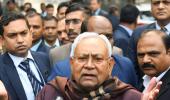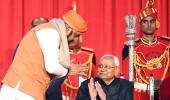At the core of Nitish Kumar's decision was a cold political calculation.
He assessed that the RJD's support base was unlikely to vote for JD-U candidates in the Lok Sabha polls.
He was unsure of winning even half a dozen if he stayed with the RJD and the Congress.

Frustration with the conduct of allies in the Opposition bloc and a honed instinct for political survival had Janata Dal-United President Nitish Kumar exit Bihar's Mahagathbandan government.
Kumar's exit from the Mahagathbandhan, which included the JD-U, the Rashtriya Janata Dal, the Congress, and the Left parties, jolted the Indian National Developmental Inclusive Alliance (INDIA) Opposition bloc.
This was a state where the bloc had hoped to dent the Bharatiya Janata Party's Lok Sabha tally.
According to a close associate of Nitish Kumar's, a combination of factors led to his exit from the INDIA bloc.
These included an outreach that Narendra Modi personally oversaw, the Congress leadership's inability to accord him the respect he expected for his role in shaping the Opposition alliance, and the Congress's December losses in the assembly polls in the Hindi heartland states.
"The Congress leadership's decision to heed Lalu Prasad's advice on Bihar, ignoring Nitish Kumar's contribution to forming the grand alliance government and shaping the INDIA bloc irked him the most," the associate, who has been friends with Nitish Kumar for over five decades, told Business Standard.

Manisha Priyam, a professor at the New Delhi-based National Institute of Educational Planning and Administration, said: "A strong Lalu Prasad working in tandem with the Congress was a matter of discomfort for Nitish Kumar."
It helped the BJP's outreach because several of Nitish Kumar's advisers, including Rajya Sabha Deputy Chairman Harivansh and others, have a good equation with the BJP leadership.
"They convinced Nitish Kumar that politically he was better off with the BJP than the Lalu Prasad-led RJD," Priyam said.
The JD-U leader was unsure of the RJD's continued support, Nitish Kumar's close associate argued.
"At the core of Nitish Kumar's decision was a cold political calculation. He assessed that the RJD's Yadav-led dominant OBC (Other Backward Class) support base was unlikely to vote for JD-U candidates in the Lok Sabha polls," the associate said, adding that the Congress' losses in the Hindi heartland and Modi's rising graph further convinced him.
The JD-U won 16 Lok Sabha seats in 2019, which it contested in alliance with the BJP. Nitish Kumar was unsure of winning even half a dozen if he stayed with the RJD and the Congress.
Nitish Kumar, unlike Prasad, is not purely a caste leader, suggesting that his alliance with the BJP is more seamless, Priyam said.
"Nitish Kumar has pursued a 'combination politics' of caste and class in the mould of former Bihar CM Karpoori Thakur," she said.
Karpoori Thakur believed that political leadership should be in the hands of the backwards.
Unlike Lalu Prasad, Thakur was anti-feudal, not anti-upper castes, backing reservations for the poor among forward castes.
"While Lalu is perceived to be anti-forward castes, Kumar understood this 'Karpoori formula' better and has taken forward castes along while cultivating a solid support base among the extremely backward castes," Priyam said, adding that Bihar is also a rare state in India with a strong sentiment of anti-Congressism.
The challenge for Nitish Kumar could be the BJP's efforts at giving representation to Kushwahas, Koeris, and even Kurmis, including the new Bihar deputy CM Samrat Choudhary.
A JD-U leader conceded that an aggressive BJP in the aftermath of the pran pratishtha at Ayodhya could turn away their party's minority support in Bihar.
"Yes, the Congress and Lalu Prasad are in a better position to attract Muslim voters, but Nitish Kumar has built personal rapport with the Muslim leadership of the state. We would need to wait and watch how this turns out," Priyam said.
According to the RJD leadership, the BJP was desperate to ensure the downfall of the Mahagathbandan government because it was the only political entity in the country that posed an ideological challenge.
It conducted the caste census, ensured large-scale recruitment in government jobs, and ensured good law and order.
After Kumar's volte face, the RJD's Tejashwi Yadav said the JD-U would be 'finished in the Lok Sabha polls.'
'Nitishji is a respectable leader, but he seemed to have a problem with me receiving credit for the many achievements of our government,' Tejashwi said.
Insiders said the Bharat Ratna to Karpoori Thakur, announced on January 23, on the eve of the leader's birth anniversary, was part of the plan to ease Nitish Kumar's entry into the National Democratic Alliance and reach out to the Extreme Backward Castes.
"The thousands that turned up for the public meeting Nitish Kumar addressed on January 24, the birth anniversary of Karpoori Thakur, should convince people that he holds sway among the EBCs," a JD-U leader said, adding that to call Nitish Kumar alone a "paltu Ram" would be to ignore the BJP leadership's role, which had declared their doors were closed for Kumar.
As for the future, JD-U leaders do not rule out the BJP subsuming their party, as it has succeeded with regional parties elsewhere, especially since Nitish Kumar does not have a successor, but at the current juncture, political survival was uppermost.
Feature Presentation: Aslam Hunani/Rediff.com











